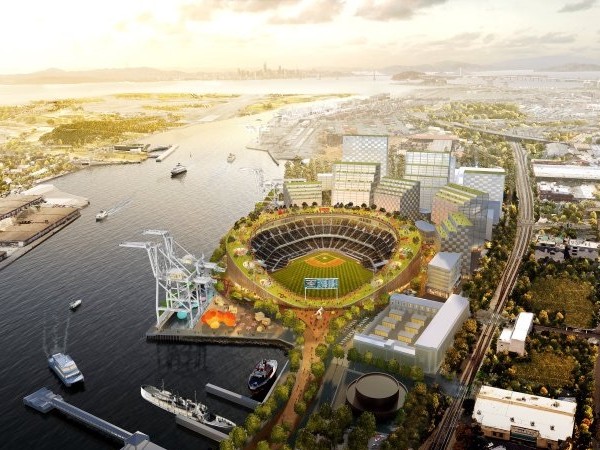Maritime opponents of the proposed Oakland A’s baseball park and condominium complex at the Port of Oakland’s Howard Terminal vigorously contested a study, backed by the A’s, stating the Port operations would not be impacted by the proposed stadium/condominium development.
On May 11th, the Bay Conservation and Development Commission (BCDC) which regulates development on the San Francisco Bay, heard testimony related to a Mercator International study supported by the Oakland Athletics. The study according to BCDC, “looks specifically at whether Howard Terminal would be needed to meet cargo projections, and concludes that there are adequate sites available without Howard Terminal.”
The contention of available space at the Port was disputed by speakers representing maritime companies working at the Port of Oakland. They argued that the Port continues to play an essential emergency services role as well as providing critical infrastructure for the import and export of containerized goods.
Evette Davis, a spokeswoman for the coalition of maritime critics opposed to the ball park later reported their argument convinced Commissioners to reject the Oakland As and Mercator conclusion:
“After two hours of presentations and comments, the committee voted to adopt the updated staff report and rejected the A’s input via Mercator– at this juncture of the process…Today’s discussion was one part of a long process that is not expected to be completed until next year.”
She added: “Although the economic situation for the Port is dire given its airport and commercial real estate holdings, the Port itself - although affected by the virus - remains a bright spot for ports on the West Coast and is expected to “weather the storm” better than others.”
Evey Wang, president of the Customs Brokers and Forwarders Association of Northern California told BCDC that the current Covid-19 pandemic is creating uncertainty about future developments: “The users of the Port services and I want to add our concerns about the ballpark. Don’t fast track this evaluation of what is necessarily an essential core area for the Port of Oakland. In the truest sense, we see the importance of the Port to the infrastructure of the region evidenced by the demands being placed by Covid-19 and the pandemic. We have a maritime business that we need to secure.”
Without referencing the Mercator study, Danny Wan, executive director for the Port of Oakland noted the benefits of additional berth space at the Port during the Covid emergency: “the Outer Harbor terminal allowed the Port to handle the evacuation of cruise ship passengers stricken by the Coronavirus on the Crown Princess last March. We were able to mobilize at short notice and provide the space for passengers disembarking from the ship and the space required at the pier for processing and transportation.”
The Crown Princess docked in Oakland on March 9 with 3,500 on board after reporting 21 coronavirus cases.
Wan also noted that making projections during the Covid-19 economic downturn is very problematic.
Andy Garcia, chairman GSC Logistics, a harbor trucking company, opposes the development as it would encroach on the Port’s essential and strategic function as a driver of international trade: “The Port of Oakland provides access to overseas destinations. The Port of Oakland emphasizes that our terminal landmass has a strategic value to companies like Tesla. I oppose anything that would transform our terminals into an entertainment and residential venue and away from being the strategic landmass it is. We should reserve that land mass for use in the export and import of products as has been done in the past.”
Susan Ransom, client services manager for Stevedoring Services of America International, operates the Oakland International Container Terminal, the largest terminal at the Port of Oakland. It is directly west of the proposed ball park at Howard Terminal. SSA is concerned about losing business due to the uncertainty that a large real estate development might pose to container handling terminal. Ransom questioned the Mercator report’s assertion that space would be freed up by future investments at terminals creating more automation and requiring less land: “The notion that we can invest a billion dollars upgrading container terminals is not something I see on the horizon. It just isn’t realistic.”
Mike Jacob, vice president and general counsel, Pacific Merchants Shipping Association (PMSA) argued that: “The projections of densification at the container terminal being sufficient to allow for the development of the ballpark and condominiums is not an assumption that we can make especially in the present economic climate.”


